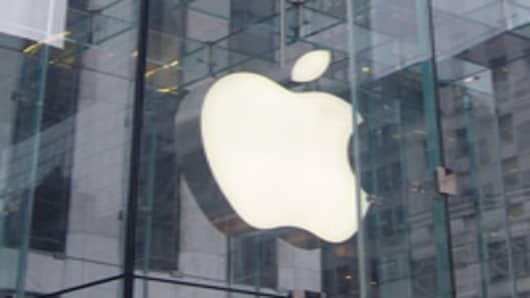That's the $150 billion question and the crux of a simmering debate between Apple fans, Apple customers, Apple investors and Wall Street.
This all hit a head earlier this week when Apple released its fourth quarter earnings and while earnings per share handily beat the Street, revenue came up light.
Or it dramatically soared past even the rosiest expectations depending upon whether you look at one column of numbers or the other. Depending on whether you use the company's generally accepted accounting principles, its GAAP results, or non-GAAP numbers instead.
And there is a chasm of difference between the two. Apple's gross revenue was either $7.9 billion GAAP, or nearly $12 billion non-GAAP. Adjusted net income grew at 125 percent compared to last year's fourth quarter using non-GAAP metrics. But it's a part of the Apple earnings story lost on most media, including me--until now, because we stick to the apples to apples comparisons of what Wall Street is looking for. Never mind nuances: If analysts offer the GAAP number for comparison, its the GAAP number we use. Lost, however, might be the real value of Apple itself, and the extraordinary growth this company is enjoying.
This all hinges on how Apple accounts for iPhone, which is much different than how it books Mac and iPod sales. When those products sell, the revenue and profit is booked. Immediately. Simple.
Not so with iPhone. Early on, Apple decided to account for iPhone sales using so-called subscription accounting, what Piper Jaffray says was a very conservative decision that might have made far more sense when Apple shares were trading at $180, than it does today with Apple shares trading at $90 and change. Subscription accounting compels Apple to defer iPhone (and Apple TV) revenue to upcoming quarters, even though the sales of those phones occur in the current quarter. Thanks to Sarbanes-Oxley, Apple must divide the sale of each iPhone by 2 years, or 730 days. Take this example: Apple sells an iPhone on Sept. 25 for $200, five days before the quarter ends. Instead of booking the whole $200, it is forced to spread the sale of the phone over the next 730 days, banking five days of revenue instead. At 27 cents a day for that phone, a $200 sale becomes $1.35 instead. And deferred revenue balloons, "a clever way," Piper suggests, "to build for the future." Instead, the accounting choice has just muddied the waters.
It becomes a monumental problem for Apple's valuation when you consider that if Apple didn't defer iPhone revenue, the product would account for 44 percent of Apple's fourth quarter revenue, and a whopping 63 percent of its profits from the device. To overlook this, and not give this its fair due is to overlook Apple's true value in the marketplace, and on Wall Street.
Mike Abramsky at RBC issued a report about this debate earlier this week and it's worth a read. He says that Apple sees iPhone not so much as a hardware product, but as a platform that'll continue to grow with new updates, applications and features. GAAP accounting was chosen, he says so that Apple "can continuously update iPhone software for free, maintaining a premium, differentiated user experience." True, but he also points out that if Apple were to go non-GAAP, its quarterly revenue and EPS "becomes more sensitive to iPhone units, which are volatile and difficult for the Street to accurately predict."
- Read: Apple's Worth: Your Emails On This Post
Huh? iPhone units are soaring, selling far better than even the most optimistic analysts anticipated. Difficult for the Street to accurately predict? Whose fault is that? Apple doesn't offer individual product line sales guidance, but believe me when I tell you there is no shortage of pretty good market research out there offering a wide range of projections. It's the Street's job to anticipate, project, estimate. Just because the job is "difficult" doesn't mean Apple should be hamstrung by a set of accounting principles that simply do not paint an accurate picture of its business.
To be candid, Apple should be a "unit-sale" story anyway: Apple sells 10 million iPhones in a quarter, no matter how it banks the revenue and profit, shares are going to climb. If it sells 1 million phones, shares are going to plunge. But that simple fact is lost on earnings day when the company "misses" its revenue estimates thanks to all these accounting complexities. And we in the media are complicit in that.
- Microsofts Earnings: A Pleasant Surprise For Rest Of Tech?
To its credit, Apple does provide both sets of figures. The company probably realizes that it has made a mistake by choosing GAAP versus non-GAAP, and is trying to rectify the situation by releasing both, but trying to focus on the latter. It's one thing for Apple to focus on the latter, but a far different thing to get Wall Street to do the same. RBC, for one, says companies using non-GAAP methods get skewered when times get tough and would therefore recommend against Apple making a change.
But these accounting illusions are creating tough times of their own for Apple because the company itself seems to be selling itself short, reporting GAAP numbers, but trying to emphasize non-GAAP after the fact. And investors are caught in the middle. Wall Street won't focus on these numbers until Apple does. And it should. Wall Street's a big boy. It can handle it.
- Wall Street Analysis and Apple Math
Questions? Comments? TechCheck@cnbc.com


